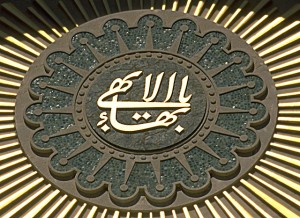 Public rites were visible across Iran on Wednesday in honor of Ashura, a major Shiite festival commemorating the death of Hussein, Muhammad’s grandson. But for Iranians who are not Shiite Muslims, public practice of their religion remains severely limited or flatly banned — and the Islamic Republic’s war on religious freedom has hurt no community more than Iran’s Bahais.
Public rites were visible across Iran on Wednesday in honor of Ashura, a major Shiite festival commemorating the death of Hussein, Muhammad’s grandson. But for Iranians who are not Shiite Muslims, public practice of their religion remains severely limited or flatly banned — and the Islamic Republic’s war on religious freedom has hurt no community more than Iran’s Bahais.
There are only 300,000 Bahais in Iran, or less than one-half of 1 percent of the country’s population. But since its founding in 1979, the Islamic Republic has singled this group out for systematic repression. In the early years, hundreds of Bahais were executed and thousands more were imprisoned. Bahai properties have been confiscated without compensation. Bahai Iranians are barred from holding government jobs, their children are excluded from the nation’s university system, their marriages are not recognized and their cemeteries and holy places have been desecrated. It is government policy to incite hatred of Bahais in the official media. And more than 100 Bahai leaders remain in prison — for the crimes of being Bahai and teaching their children their religion.
Iranian President Hassan Rouhani has sought to cast himself as a moderate. His “rise to power and the strengthening of his position will come at a cost to Iran’s hard-liners,” the Iranian-born analyst Meir Javedanfar predicted last month. Here is a good test: Will the harsh conditions for Iran’s Bahais improve? After decades of oppression by the Islamic Republic, will the bitter official pressure be reduced?
Alas, the evidence suggests the answer is no. To smooth Rouhani’s path at the U.N. General Assembly in September, Iran released 11 prisoners of conscience — but not one was a Bahai. In August a well-known Bahai in Bandar Abbas, Ataollah Rezvani, was murdered. Before his death, human rights groups report, Rezvani had received threats and been pressured by agents of the Ministry of Intelligence. He also received threatening phone calls. The government opened an investigation, but no progress has been reported.
Amnesty International reported last year that: “Non-Muslims, especially the Baha’i community, have been increasingly demonized by Iranian officials and in the Iranian state-controlled media. In 2011, repeated calls by the Supreme Leader and other authorities to combat ‘false beliefs’ — apparently an allusion to evangelical Christianity, Baha’ism and Sufism — appear to have led to an increase in religious persecution. The Baha’i minority . . . suffers particularly harshly at the hands of the state, which regards it as a ‘heretical’ sect.”
Mistreatment of Bahais is only one aspect of Iran’s human rights disaster. In Iran, there is no freedom of the press, no freedom of speech, no independent judiciary, no free elections. There is no freedom of religion — not even for Shiites, who are forced by Iran’s theocracy to adhere to one narrow set of official rules. The “quietist” school, which believes that politicians should lead the government while clerics provide moral and religious guidance but do not rule, is considered heretical. Those who believed that Rouhani, once elected president, would move toward greater respect for human rights have been disillusioned. Hossein Mousavi and Mehdi Karroubi, the two former presidential candidates whose reformist ideas led them to be placed under house arrest in February 2011, remain in detention; since Rouhani took office, they have been permitted more family visitors but not freedom.
Similarly, Rouhani has been no help to Bahais. In his Sept. 19 op-ed in The Post, Rouhani wrote that “we must join hands to constructively work toward national dialogue, whether in Syria or Bahrain. We must create an atmosphere where peoples of the region can decide their own fates.” How about in Iran? The persecution of Bahais gives the lie to his pose as a moderate.
In his address to the General Assembly, Rouhani spoke of peace and democracy and said it is “vital to promote tolerance.” But his government shows Bahais no tolerance, and he is continuing his predecessors’ pattern of preventing any kind of normal life for them. Rouhani is no reformer or moderate. His smooth words merely hide the suffering of his country’s Bahai citizens. Whatever the trajectory of the nuclear negotiations with Iran, diplomacy should never be allowed to obscure the harsh facts about Iran’s miserable human rights situation and the regime’s assault on Bahais.
By: Elliott Abrams
A senior fellow for Middle Eastern studies at the Council on Foreign Relations. He was a deputy national security adviser in the George W. Bush administration.
Washington Post

Leave a Reply
You must be logged in to post a comment.